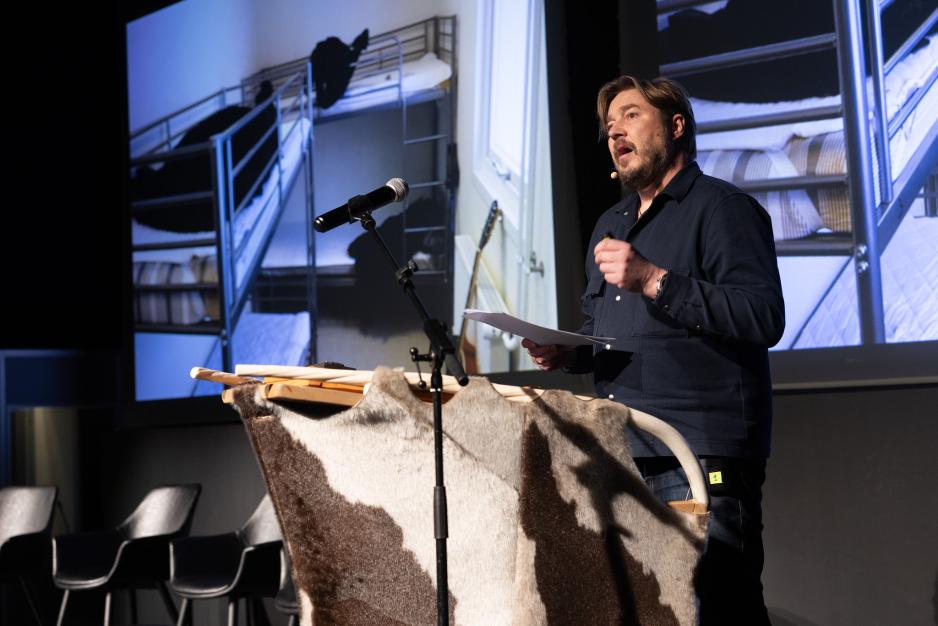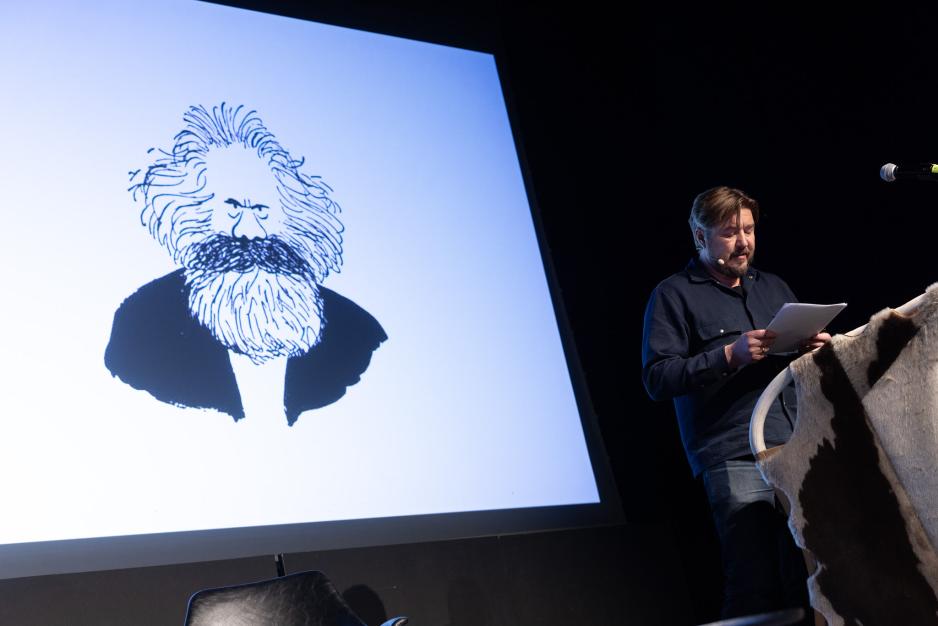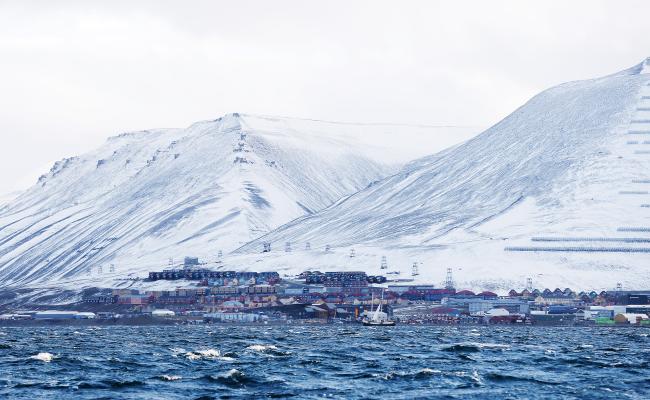Greenland Science Week: Homelessness in Greenland: Broken Collectivism in Action

Professor Steven Arnfjord addressed Greenland's homelessness problem during Greenland Science Week in Nuuk. (Photo: Arctic Hub)
Nuuk, Greenland (High North News): Homelessness is an increasing problem in the Arctic, also in Greenland, where about 1% of the country's population is homeless. Professor Steven Arnfjord's suggested counter-measure to social problems is not more science, but more action and activism.
1 percent (491 people) of Greenland's 56,000 inhabitants are homeless. The problem is most apparent in the country's capital, as is the pattern across the Arctic.
Greenland is not alone in seeing a rise in homelessness in the North. 0,3 percent (2,684 people) of Alaska's population was homeless in the latest count, a record-high number, and the state has seen a 40,8% rise in homelessness since 2019.
Another pattern of Arctic homelessness is that it impacts Indigenous Peoples at a hugely disproportionate rate. In Canada, 35% percent of homeless individuals identified as Indigenous, while only making up 5% of the Canadian population. Indigenous people are also overrepresented in the Greenlandic homeless statistics.
Steven Arnfjord, a social science professor at Ilisimatusarfik, the University of Greenland, has studied homelessness in Greenland. He took to the stage during the Greenland Science Week to address this welfare issue and to urge researchers to act.

Steven Arnfjord, a professor at the University of Greenland, held a keynote speech at the Greenland Science Conference in Nuuk titled 'No eyes on the marginalized.' (Photo: Arctic Hub)
Arnfjord said that the dissolution of the former 18 Greenlandic municipalities has had a role to play in the rise of homelessness in the country. In 2009, the country restructured into four regional municipalities, leading many to be far away from decision-making centers.
Centralization and rapid modernization have taken a toll on the population of Greenland, with an increase in unemployment and a lack of housing outside city centers. Many move to the capital in search of better opportunities. For some, the search instead ends in homelessness.
"After 7-8 years of field work, we conducted the first national homeless count in 2022. Almost 1 percent of the population was counted as homeless, a level ten times higher than in the West," says Arnfjord.
Broken collectivism
At the Greenland Science Conference, Arnfjord presented the concept of 'broken collectivism.'
Collectivism is the practice of giving a group priority over each individual in it, and Arnfjord believes that this concept, which once was the social fabric of Greenland, has been broken. This could be explained by Danish colonialism, which, in turn, introduced welfare systems in an attempt to repair the problem.
"There has been both intended and unintended erosion of Indigenous social cohesion dependent on collective structures. A colonial administration imposed a systemic superstructure, like welfare," he explained.
He said that industrialization and modernization have created urban centers, as well as a new need for health care, daycare, afterschool care, elder care, and so on.
"This has created distance between people and promoted individualism," he said, and continued:
"In Northern Europe, you can see the consequences of individualism run amok with loneliness as one of the most severe social problems."
The Salvation Army in Nuuk feeds up to 70 people every Wednesday with its soup kitchen. It is also a place of community for the city's homeless people. (Photo: Birgitte Annie Hansen)
Arnfjord referred to a nationwide study conducted in 2017, which showed that a majority believe that the individual is to blame for their own problems.
"It is broken collectivism at its fullest! It's victim-blaming. The enormous change in structure in 2009 had a devastating influence on the individual, consequences out of the individual's control," proclaimed Arnfjord.
"Stop writing in journals!"
The researcher's suggested counter-measure to social problems is not more science, but more action and activism. He urged the audience to put themselves at risk of criticism, to press decision-makers, and to protest.
"Stop writing in academic journals that not even your mother reads! Do, act, react, object, volunteer, and support. Your resources are not money or your academic brain, but your actions. Think about how you can be of service!" he exclaimed.
While criticism is the classical activity of the social sciences, the researcher said he finds the practice tedious. He explained that it is easy to criticize and evaluate, without actually knowing if the work will be used for anything, and that the result of much social science might often just be an unread piece of paper.
"Are we seeing any direct action after our brilliant work on the outskirts of society?" he asked the audience.
The outsiders
The researcher believes that the problem with marginalization in Greenland is that it is tied to legislation.
"It is very much the public opinion that this is a matter of agency. People think that it is the character of the individuals that has put them in these situations."
The consequences of individualism run amok.
Many believe that homeless people should just get their act together and get a job, or that they are all drunks that can't or won't be helped.
"I sometimes wonder if the general fascination with homelessness is the self-affirmation that they could be doing a lot worse," stated Arnfjord, and continued by saying that there is a dire need for legislation.
"There aren't any written rights. You aren't guaranteed shelter. There are only shelters in a few towns, and they are operated by the public. These are also just emergency shelters," he remarked and continued:
"There are no wet shelters, so no help for active alcoholics. And if you didn't already have a drinking problem when you ended up homeless, you will be at great risk of developing a substance abuse problem."
Due to rapid urbanization, Nuuk is facing a severe housing problem, characterized by long waiting lists for state-owned apartments, a lack of affordable housing, and a high cost of living. (Photo: Birgitte Annie Hansen)
Lack of residences in Nuuk
The urbanization in Greenland has left the property market under pressure, and while some new buildings are under construction, they are often very expensive and out of reach for people getting back on their feet. In Nuuk, there can be up to 7,5 years of waiting time for a rental property.
From the stage, Arnfjord called for a social and political focus on housing and an investment in the welfare sector.
"If you ignore homelessness, it will get worse, and people will suffer needlessly," stated Arnfjord and concluded:
"And consider, all of you competent people in this room, how can you in your spare time be a support for your local society?"


